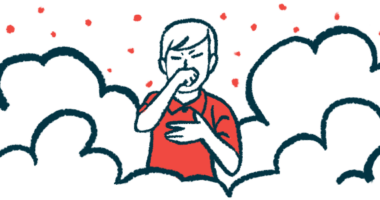Caregivers Are Only Human

Ten years ago today, my husband, Todd, was diagnosed with ALS.
I’m grateful that our kids have had their dad much longer than we thought they would. When Todd was diagnosed, Sara was 4, and Isaac was just 9 months old, so we thought they might not even remember him. But he’s been here for more than half of their childhoods.
I’ve been blessed with the extended friendship and love of my husband. I’m grateful to be part of a small subset of spouses who spend more than a decade caring for their partners, but it’s been a tough road in ways I never expected.
If I could go back in time, what would I tell myself? What would I say to 32-year-old Kristin 10 years ago, when she was so devastated by the awful diagnosis, when her grief was focused on losing her husband to an early death?
I know what I wouldn’t say. I wouldn’t tell her that life would be harder than she imagined.
I wouldn’t say, “Girl, you have no idea what you’re in for. You’ve lost hopes and dreams, but other losses are coming that aren’t even on your radar.”
That woman wasn’t aware of the physical toll that caregiving would take on her body. She didn’t consider that she would grieve the loss of physical intimacy as her husband became paralyzed.
She could not have prepared if I told her she would lose some dearly held core beliefs about faith and life in a long, painful process.
It would have strained her relationships with friends and family who were supportive at the time if she had known that some would drift away after the crisis became chronic. It would’ve been too cruel to tell her she would grieve the loss of beloved family members, like her father and aunts, long before Todd would die.
While she was focused on her husband’s impending death, she didn’t know that the journey to the end would be so painful —that daily life would be distressing when Todd gasped for air and she’d run to help him cough up mucus so he could breathe.
That woman of the newly diagnosed husband with ALS could not have prepared even if she had known what was coming, so I wouldn’t tell her what the future held. And I wouldn’t tell any spouse caregiver what to expect, because every person’s journey with ALS is different.
But there are a few things that I would tell myself, if I could go back in time.
I would say, “Be kind to yourself, because even though you love your husband and try to translate that love into action, it’s not going to feel like enough. No matter how well you ‘do’ disability and terminal illness, it’s overwhelming. You aren’t going to master this physically, theologically, or emotionally. You’re only human.”
I would tell the Kristin of a decade ago to watch for a new song that would be released in a few years called “Human,” by Christina Perri. In the lyrics, she hopefully considers the things she would do for love: “I can stay awake for days.” She could “be a good machine” and “hold the weight of worlds” if that’s what her love needed.
I would tell my past self to pay attention to the bridge and the chorus, because after the mantra “I can do it, I’ll get through it,” Perri sings, “I’m only human, and I crash and I break down.”
I still don’t know what the future holds as Todd and I begin the second decade after his diagnosis, but I have an inkling, which is terrifying in itself, and it may be harder than I imagine. That is one of the hardest things about this disease — living with the knowledge that the future will be harder than today. But just as the last decade contained joy mixed in with the sorrow, I am hopeful that the next decade will as well.
Whatever happens, I’m telling present Kristin to be kind to myself, because I’m only human.
***
Note: ALS News Today is strictly a news and information website about the disease. It does not provide medical advice, diagnosis, or treatment. This content is not intended to be a substitute for professional medical advice, diagnosis, or treatment. Always seek the advice of your physician or other qualified health provider with any questions you may have regarding a medical condition. Never disregard professional medical advice or delay in seeking it because of something you have read on this website. The opinions expressed in this column are not those of ALS News Today or its parent company, Bionews Services, and are intended to spark discussion about issues pertaining to ALS.







Linda Gundersen
Thank you Kristin. Your post comes on a day when I'm really feeling low. Blessings to you and Todd.
Linda
Kristin Neva
Thanks Linda! I'm glad my column was an encouragement.
Helen Baldwin
Beautiful column, Kristin. Sharing your story will undoubtedly help others who find themselves in the role of caregiver.
Kristin Neva
Thanks Helen! When I connect with others who have been at this a long time it helps knowing I'm not the only one.
Denise Hagen
Thank you for putting your experience, raw feeling and humanity into words. You're right, every ALS story is different. We all need to find a little light to keep us moving forward. Best to you and your family.
Kristin Neva
Thanks Denise!
Ann Jost
Great words of wisdom. Unfortunately all true. Caregiving is hard and gets harder as time goes on. It certainly does take a toll on the body, mind and spirit. Good luck with your journey. Blessings.
Kristin Neva
Thank you Ann!
Rebecca Balko
Thank you for your post. I just stumbled across this site. My husband was officially diagnosed one week ago with ALS - however has a test on the 17th I think for reflexes. His speech slur began a little over a year ago, but got significantly worse a couple of months ago. He has (as of year) chosen to not read anything until all tests are done. He is, of course, very overwhelmed. I’ve read, but found I just can’t to much as it is more than I can take and don’t want to be emotional in front of him. Anyway - thank you for writing that.
Kristin Neva
Wrapping one's mind around this diagnosis is so, so tough! Yes, sometimes better not to look too far ahead--just the next step so we can be proactive, but going to far into the future is overwhelming.
Janine Stanfield
Kristin, thank you for sharing your story so eloquently. My husband was diagnosed in June 2003, he was 29 and I was 27. We had been married for 8 months and had a fantastic life planned out, when we got the devastating news. We’ve been blessed with 2 kids, now ages 13 and 15, and I also remember thinking they may not even remember their loving father. My husband is going on 17 years after diagnosis and is still active in all of our lives, but the struggles you describe are very familiar and real. I often feel like no one else can possibly understand what we go through on a daily basis, but there are a handful of us that can relate. Thank you so much for putting your story out there! Stay strong and never give up!
Kristin Neva
Yes! Such a blessing to have our husbands and our kids to have their fathers--but what a long, hard road.
Allen
Hi Kristin
Thanks much for your piece about Todd hanging up his keys. I'm just wondering, because I don't think you said, how much time passed between the initial als diagnosis and his accepting not to drive anymore. I was just diagnosed with "probable" als today, accent on the probable. The neurologist said there were other tests - blood, mri etc that could point to some other cause of my symptoms, which today amount to mostly slurred speech and minor muscle weakness. But I'm not optimistic. And I do really love to drive. At my age (79) it's really the only activity I look forward to. My wife I think is growing suspicious of my insistent offers to drive her places where she could walk or go with friends. I truly dread having to one day give up driving and so I was wondering how much time your Todd had behind the wheel. Thanks again.
Kristin Neva
Todd drove for three years--The rate of progression is so varied.
Allen
Actually at this point three years doesn't sound too bad. I'll take it. Would take anything I can get, really.
Cheers.
Beverly Smaby
My husband's alarming symptoms started 9 years ago, but was finally diagnosed with ALS 4 years ago when we were both 75. By that time we had been married 55 years. I know that we are very blessed to have had so many years before onset to live a full life and gather glorious memories. The problem for me as a caregiver is my own advancing age. I'm pretty fit for an almost 80 year old, but the stress is taking its toll and I'm frightened I won't last long enough to see this process through and be there for him.
Beverly Smaby
I meant to say thank you to all of you for sharing your experiences. It helps a lot to know there is a whole community out there of people out there who truly understand. I take courage from all of you.